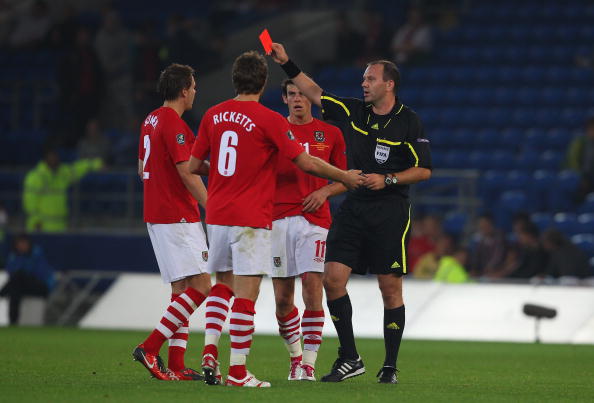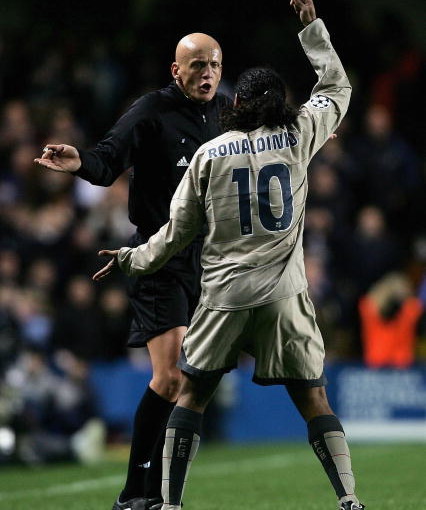By Andrew Warshaw in Monaco
August 26 – Players who surround the referee to protest decisions could be red-carded in a new crackdown initiated by Pierluigi Collina, arguably the game’s most famous official who is now UEFA’s chief refereeing officer.
Collina said officials in this season’s two European club competitions had been instructed to be more vigilant than ever when it came to deliberate provocation.
“We don’t want to see referees mobbed by players, where players run from long distances to crowd the ref,” said the iconic Italian.
“This could even be punished by a red card.
“Certainly one of the things we need to improve is stopping this kind of behaviour.
“It’s not nice to see.”
Collina said serious foul play would not be tolerated either.
“I don’t need to speak about zero tolerance; referees have been instructed to protect the players,” he said.
“We don’t need doctors on the pitch.
“We do not want to be in a situation where we have broken legs.
“Better to convince the players to stop before.
“Look what happened to Eduardo a few years ago.
“It was shocking and was not football.
“If there is a serious risk to endanger the safety of an opponent, this has to be removed before there is actual damage.”

Collina admitted that there was still considerable room for improvement when it came to the roles of the two extra officials that have been used in both European club competitions and look set to be implemented at next year’s Euro finals in Poland and Ukraine.
First among these was the need for better communication between all the officials involved.
“For someone who is used to take a decision on his own, based on his own feeling and vision, to change this mentality and accept that a decision could be taken by someone else is not easy,” Collina admitted.
As a result, Collina revealed, former English referee Phil Sharp would be taking a specialist workshop in Poland just before the 2012 finals to provide special training for the 12 quintets of officials who will take charge at the tournament.
“The decisions of the additional assistant referees can be very important so we have decided for the first time to have an experienced former referee to coach them,” he said.
“We are certain the standard of their performance will be improved.”
Despite many club coaches insisting the introduction of two extra officials has had little positive effect, Collina said the feedback from his colleagues had been excellent, especially as a deterrent when it came to shirt pulling at set pieces.
“The number of these kinds of incidents has decreased a lot,” he said.
“When you see a policeman driving, you slow down.”
Collina was making a special presentation outlining the different tasks and relative categories of UEFA officials.
He gave the broadest hint yet that UEFA would oppose goalline technology, due to be debated again next year by the game’s lawmakers, the International FA Board, ahead of possible introduction by the 2014 World Cup.
“The experiment we are [already] running gives us a positive feeling in terms of controlling the goalline,” he said.
“At the moment we are very happy with this human solution.”
Contact the writer of this story at zib.l1752121206labto1752121206ofdlr1752121206owedi1752121206sni@w1752121206ahsra1752121206w.wer1752121206dna1752121206

